How do we know what passages of Scripture are most important? We know that our favorites are not necessarily the most important because we tend to leave out the demanding and challenging passages. We tend to choose those passages we simply like. So, how do we know what is most important? How do we know which passages of Scripture are what is CORE to our faith and following Jesus?
For our focus in this upcoming series,[NOTE] we are using two guiding principles:
- CORE Scriptures must center on what Jesus did to bring salvation.
- CORE Scriptures must center on what Jesus taught as essential.
While John 3:16-17 are certainly key verses talking about God's love, they point us to Jesus. Jesus is our center. While Matthew 22:34-40 are important truths for us about our responsibility to love, Jesus is the one who taught these truths. While Matthew 28:18-20 are important reminders about our mission in the world, Jesus gave his Great Commission to us.
Jesus is the foundation of "What Is CORE!" After all, God loved us so much that he sent Jesus to save us. God did not send a book or a committee, or an idea. He came in human flesh and lived among us. The Son of God showed us God's truth and demonstrated God's love to us and grace for us as Jesus of Nazareth (John 1:14-18). As God in human flesh (Hebrews 1:1-3), Jesus taught us the two great commands and gave us his Great Commission. Jesus is at the center of what is important to us as disciples!
Jesus is God's ultimate and most unmistakable message (John 1:1-18). So, when Paul set out to teach the embattled, selfish, and immature Christians of Corinth what was "of first importance," he pointed them to Jesus (2 Corinthians 1:19-20). Paul specifically emphasized what the four gospels - Matthew, Mark, Luke, and John, the stories of Jesus' life - spent the most time emphasizing: Jesus' death, burial, and resurrection (1 Corinthians 15:1-7).
For our series of messages on "What Is CORE?" we begin with Jesus! He is the center of everything that is CORE to our faith and discipleship. He is the center of everything vital, meaningful, lasting, central, essential, and saving. What Jesus did for us and how we connect to those saving events in faith are also CORE. They enable us to experience the saving work of Jesus personally and as a family of Jesus' brothers and sisters.
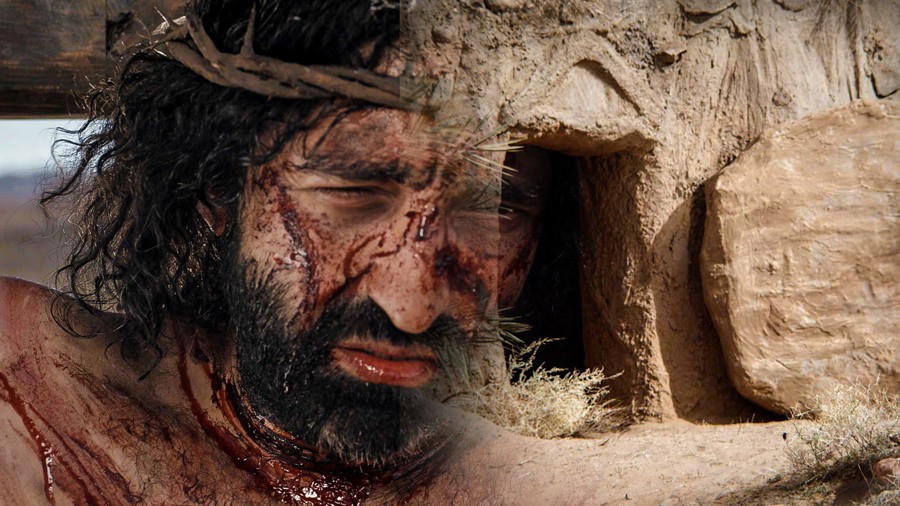
When asked, Jesus pointed to two love commands as the most important commands of Scripture. We must love God with everything we are and must love our neighbors as we love ourselves (Matthew 22:34-40). Jesus further emphasized the importance of a specific category of neighbor: other disciples - those who are our brothers and sisters in faith (John 13:24-25). The apostle John emphasized this theme repeatedly as he talked about our life as disciples (1 John 3:16-18, 4:7-12). The apostle Paul also stressed how central, how CORE, love must be in our lives as Jesus' followers (Romans 13:8-10; 1 Corinthians 13:1-13; Galatians 5:14). Loving God, each other, and our neighbors are part of "What Is CORE" to our faith as followers of Jesus.
The Lord's Supper - what is sometimes called the Eucharist - is also a part of "What Is CORE." The Supper, Communion, invites us to participate in Jesus' body and blood while remembering what he did for us through the cross, burial, and resurrection. The early church often focused on The Supper on the day of resurrection, Sunday, the first day of the week (Acts 20:7), and this "breaking of bread" was central to their lives as Jesus' followers (Acts 2:42). They remembered his victory and recounted his first appearances to his disciples on consecutive Sundays (John 20:1, 19-22, 26-28). We share The Supper anticipating Jesus' return when we will be fully united with him and all who are his (1 Thessalonians 4:13-18). The Supper not only declares the central CORE message of Jesus' saving work, but as disciples, we actually participate in those saving events by sharing in the Supper together and declaring what Jesus did to save us (1 Corinthians 10:16-17, 11:23-26). The Supper is both personal and communal. Disciples believe we participated in the events of first importance, the CORE events of salvation. We share The Supper as a community of disciples - people committed to loving each other as well as the lost people of our world as our Lord did. As we share The Supper, we also pledged to follow the way of the cross in our relationships with each other and their neighbors (Luke 22:20).
Once again, we are brought back to the fundamental reality of our faith: Jesus is central; Jesus is CORE to our faith!
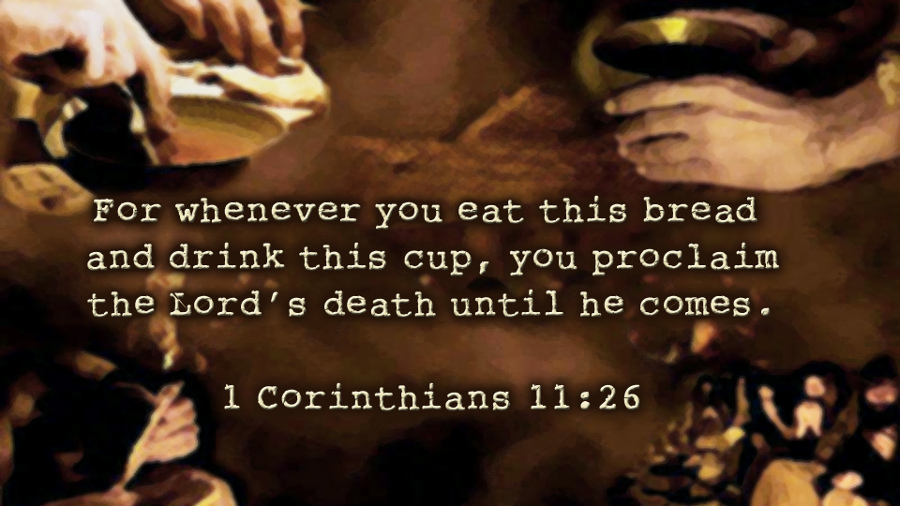
Is there anything else that should lie at the CORE of our faith?
Jesus, having all authority on earth and also spiritually, gave a set of related CORE principles in his Great Commission (Matthew 28:18-20). He emphasized his right to give these commands because he had all authority. He emphasized the importance of this command because it was his final command to them before ascending to the Father.
The Lord also tied his Great Commission to the things of first importance that Paul later emphasized - Jesus' death, burial, and resurrection (1 Corinthians 15:1-7). The principles of the Great Commission were also integral to loving God, each other, and our neighbors (1 John 3:16-18). The commands came with the powerful promise that Jesus, our Lord, would be with his disciples always, to the end of this age, as the Spirit empowered them to be witnesses to the world.
Luke complements Jesus' Great Commission with his account of the Lord's ascension (Acts 1:8-10). Jesus focused his last words on his disciples being disciple-makers. Jesus defined true disciple-making as going, baptizing, and teaching others to obey him. He promised his presence and the power of the Holy Spirit as they obeyed him - the Holy Spirit Jesus pours out on us when we are born into Jesus' family (Titus 3:3-7).
Let's conclude by looking at why the commands and promise of the Great Commission are so essential by highlighting three truths connecting us to Jesus:
Truth 1: Jesus Commanded His Followers to Make Disciples:
Jesus - as the resurrected Son of God, Savior, and Messiah - claims that he has all authority in heaven and on earth (Matthew 28:18). God had previously demonstrated his approval and authority over the Law (Moses) and the prophets (Elijah) to Jesus' inner three apostles - Peter, James, and John. Jesus' superiority and authority were God's message to the inner three apostles at Jesus' Transfiguration (Matthew 17:1-8). God had previously declared something similar from the heavens when Jesus was baptized (Matthew 3:13-17).
Jesus had also previously claimed that he was the fulfillment of the Law and the prophets. He then demonstrated this authority by repeating a similar formula, "You have heard that our ancestors were told… But I say…" (Matthew 5:17-48). In his ministry and through his miracles, Jesus demonstrated his authority to liberate people from the power of demons, death, disease, and disasters (Acts 10:36-38; cf. Mark 5:35-43). Jesus' prediction of his rejection, crucifixion, and resurrection before they happened also emphasized his authority. The Lord then endured crucifixion and burial before triumphing through his resurrection from the dead, proving his identity and demonstrating his right to use his power as Lord (Romans 1:1-4).
We shouldn't be surprised that Jesus rightly claimed his authority before ascending back to the Father. He gave his last command to the disciples exercising this authority. His final words sizzled with significance as well as revealed what he wanted most from his disciples. Jesus authoritatively commanded them:
Then Jesus came to them and said, "All authority in heaven and on earth has been given to me. Therefore go and make disciples of all nations, baptizing them in the name of the Father and of the Son and of the Holy Spirit, and teaching them to obey everything I have commanded you. And surely I am with you always, to the very end of the age" (Matthew 28:18-20).
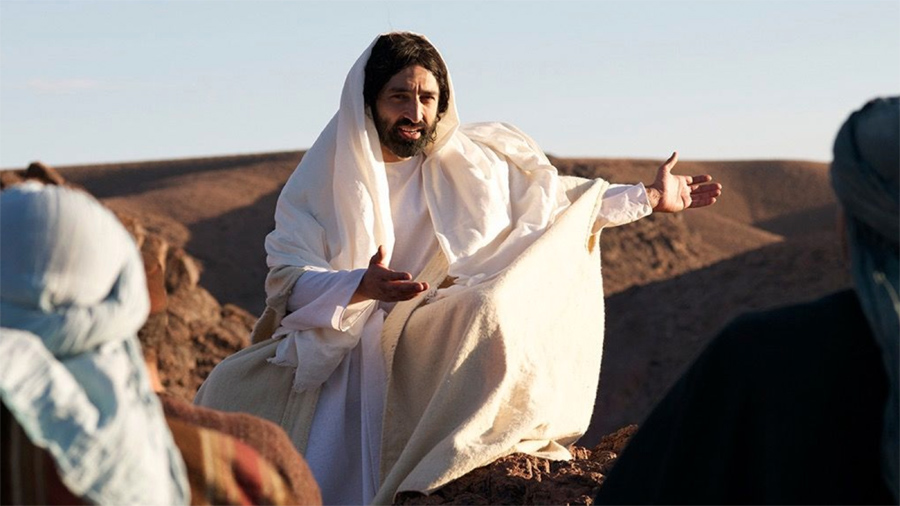
Truth Two: Jesus' Followers Were to Make Disciples by Going, Baptizing, and Training:
Three connected actions - going, baptizing, and teaching to obey (training) - were essential to obey Jesus' central command to make disciples. They were to go to all people. Just as the Father had been Jesus, Jesus was now sending them (John 20:19-21). God had sent Jesus because he loved lost people (John 3:16-17). In the Great Commission, Jesus sent his disciples to reach lost people with the good news of God's love and grace (Acts 2:33-41).
He commanded his disciples to baptize people as they called on Jesus as Savior and Lord wanting to be saved (Acts 22:16; Romans 9:9-13). They shared with Jesus in his saving death, burial, and resurrection in baptism (Romans 6:3-7; Acts 2:38-41). By faith and through the power of the Holy Spirit, they were born of God (John 1:10-12, 3:3-7). They received the gift of the Holy Spirit (Acts 2:38-39) as Jesus poured out the Spirit upon them (Titus 3:3-7). The Spirit made each new believer a part of Jesus' bodily presence on the earth, the church (1 Corinthians 12:12-14).
Jesus' goal for early believers wasn't just to get them to make a decision about him but for them to become his disciple - someone who would become like their Teacher (Luke 6:40). The command was to make disciples. A disciple is more than someone believing facts about Jesus; they were people who submitted to the lordship of Jesus while being trained to obey all that Jesus had taught them by his words and his example. Paul emphasized that all believers needed to grow into the likeness of Jesus (Colossians 1:28-29; Galatians 4:19; 1 Corinthians 11:1). He expended his energy to help each person he led to Jesus to become mature in Christ (Colossians 1:28-29). He also stressed that the Holy Spirit would help them gradually transform to become increasingly like Jesus as they focused upon their Lord (2 Corinthians 3:17-18). Paul then taught those he led to Christ to help others grow to maturity as disciples as well (2 Timothy 2:1-2).
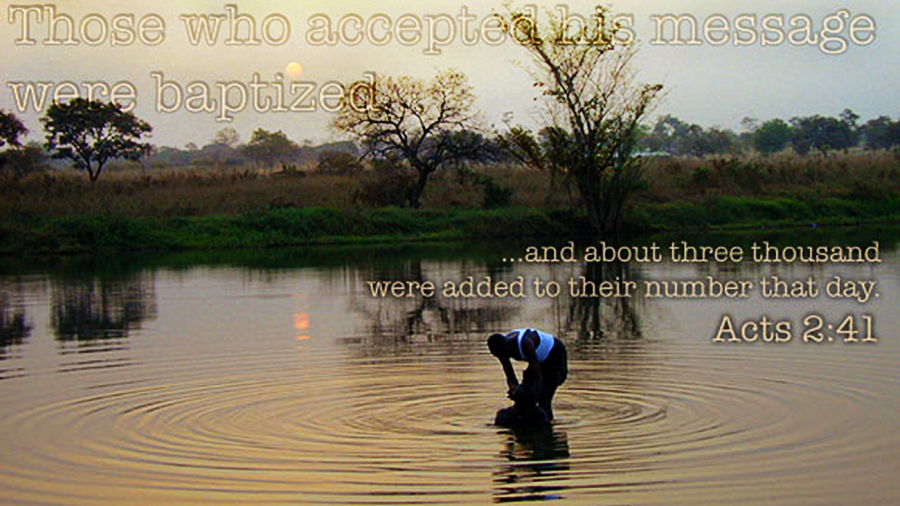
Truth Three: The Power to Make and Become Mature Disciples Is the work of the Holy Spirit:
From the beginning, when people believed in Jesus as Christ and Lord, turned their lives around to follow him, and submitted to baptism, they were given the gift of the Holy Spirit (Acts 2:36-41). Jesus had promised that the Holy Spirit would empower his followers to make disciples of all nations as they were witnesses to all that they had heard and seen (Acts 1:8). The Spirit within them empowered them to be able to do more than they could ask or even imagine (Ephesians 3:20-21), the Spirit would transform them to become like Jesus (2 Corinthians 3:18).
Paul prayed that new disciples would be strengthened and enlightened in their inner being so that they could know the power available to them from the Holy Spirit within them (Ephesians 1:16-19, 3:14-16). The Spirit grew them together to become a living temple where God lived through the Spirit (1 Corinthians 3:16; Ephesians 2:19-22). The Holy Spirit interceded for them (Romans 8:26-27; Ephesians 2:18), making their prayers powerful and effective (Ephesians 6:18; Jude 1:20). The Holy Spirit made each follower of Jesus a holy place, bought by Jesus' sacrifice and filled by God's presence (1 Corinthians 6:19-20). The Spirit gave them the power to persevere under challenging circumstances and poured God's love into their hearts to help them endure (Romans 5:1-5). The Spirit was the promised reservoir of Jesus' strength and presence, alive in his disciples in response to their prayers (Luke 11:13; 1 Thessalonians 4:8).
Let's summarize our introduction to "What is CORE" as we begin our ten-week series of messages:
Jesus is the center, and the central focus, of "What is Core" to our faith - especially Jesus' saving death, burial, and resurrection.
Jesus taught us that loving God, each other, and our neighbor were the most important commandments.
Jesus gave one clear command to his followers before he ascended back to the Father. He told us to make disciples:
- Going to all nations.
- Baptizing in the name of the Father, Son, and the Holy Spirit.
- Training new disciples to obey all that Jesus had taught.
Jesus promised to provide the power for them to do all of this and more. Our power comes from the Holy Spirit, who is alive inside us and will work to transform us to become like Christ.
- Do I believe this?
- Do I let this change who I am?
- Do I let this guide me to what is important in life, in fellowship, in worship, and in doctrine?
How can we not?
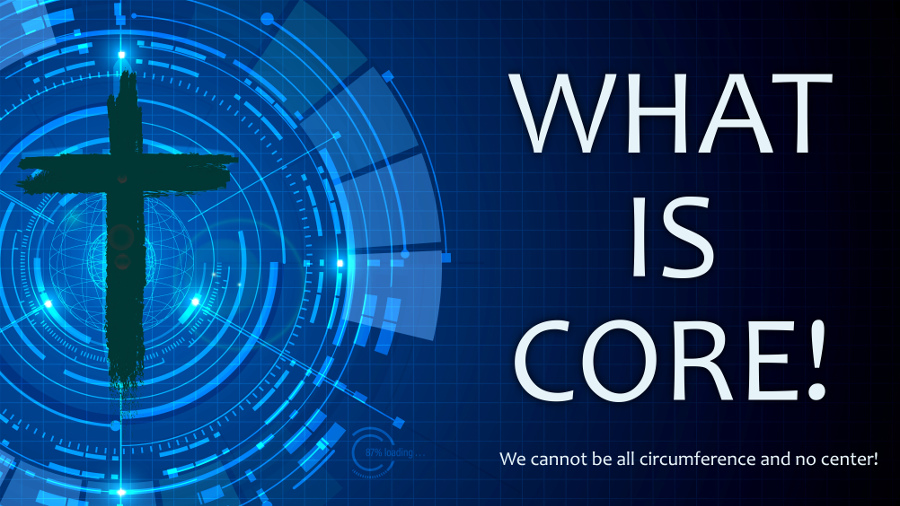
- Jesus!
- Believing
- Disciple-making
- Going
- Baptizing
- Training
- Loving
- Communing
- Worshiping
- Finishing
Special thanks for the use of images related to Jesus' ministry from The Lumo Project and Free Bible Images.













Comments
Have thoughts on this article? Leave a comment